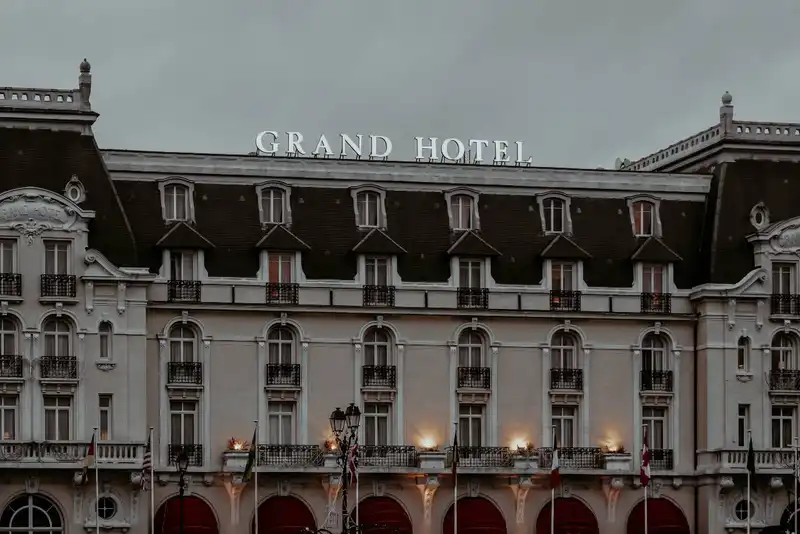What are some of the common food safety violations?
Common food safety violations include improper food storage, inadequate hand hygiene, cross-contamination, improper cooking temperatures, and poor sanitation practices. These violations can lead to the risk of foodborne illnesses and pose a threat to public health.
A Guide to Food Safety Compliance in Hospitality
Redefining Hospitality Dynamics
The close connection between hospitality businesses and regulatory laws and regulations is a critical factor that shapes the industry's course of action. In the current environment of heightened scrutiny and evolving legal landscapes, hospitality industry executives must pivot their strategies towards a paradigm of proactive compliance to ensure enduring success.
The traditional view of compliance as a reactive response to regulatory demands is no longer relevant. A paradigm shift is imperative, one that embraces proactive compliance as the linchpin for navigating the complex regulatory terrain. Proactive compliance transcends mere adherence to legal requirements; it embodies a forward-thinking approach that anticipates, incorporates, and even shapes regulatory expectations.
Hospitality industry executives must recognize that regulatory compliance is not a bureaucratic hurdle but an integral part of their business strategy. A proactive stance ensures that businesses not only meet current regulatory standards but also position themselves ahead of the curve. By actively engaging with regulatory changes, hospitality entities can future-proof their operations, fostering resilience and adaptability in the face of changing regulatory conditions.
The concept of proactive compliance involves an ongoing commitment to staying abreast of regulatory developments. This entails robust monitoring mechanisms, regular assessments, and a willingness to embrace change. By doing so, hospitality businesses can streamline their operations, reduce risks, and gain a competitive edge in an industry where adaptability is key.
Executives in the hospitality sector should view proactive compliance as an investment in long-term success. In addition to reducing legal risks, this approach cultivates a positive reputation and enhances stakeholder trust. In an era where consumers are increasingly conscientious about ethical business practices, demonstrating a commitment to compliance can be a powerful differentiator in a crowded marketplace.
As the hospitality industry is challenged by a regulatory environment, those who embrace proactive compliance will not only meet legal requirements but will also pave the way for sustained growth. This proactive approach is not just a response to regulatory mandates; it is a strategic imperative that positions hospitality businesses as leaders in an era where compliance is synonymous with enduring success. With this mindset, hospitality industry executives can navigate regulatory complexities with confidence, secure in the knowledge that proactive compliance is the compass guiding them toward a future of sustained prosperity.
Understanding and Navigating Regulatory Requirements

Compliance with regulatory requirements is a fundamental component of long-term success in the dynamic landscape of the hospitality industry. Knowing how to navigate the complex web of regulations is extremely important for hospitality industry executives seeking to establish and maintain a thriving business environment.
Health and Safety Regulations
In a post-pandemic era, heightened health and safety standards have become non-negotiable. Hospitality establishments must rigorously adhere to sanitation protocols, implement contactless services, and ensure a safe environment for both guests and staff. By embracing and enforcing these standards, the industry not only meets legal obligations but also gains the trust and confidence of its customers.
The Accessibility Standards
Hospitality venues must ensure that their facilities are accessible to individuals with disabilities. This involves providing accommodations, such as ramps and accessible bathrooms, to create an inclusive environment. Compliance in this realm not only fosters a sense of equality but also broadens the customer base.
Food Safety Regulations
From procurement to preparation, hospitality executives must adhere to stringent guidelines, including obtaining a food safety certificate, to guarantee the safety and quality of their culinary offerings. This entails regular inspections, employee training, and meticulous record-keeping. By meticulously adhering to these regulations, establishments safeguard their reputation and, more importantly, the health of their patrons.
Environmental Sustainability
In a world where sustainability is of the utmost importance, hospitality industry executives must adopt sustainable practices. From waste reduction to energy efficiency, compliance with environmental standards is not just a regulatory requirement; it reflects a commitment to corporate social responsibility and resonates positively with environmentally conscious patrons.
Maintaining Compliance
Establishing a successful business requires a proactive approach to stay abreast of evolving regulations and swiftly adapt operations accordingly. Hospitality industry executives must establish robust internal processes, conduct regular audits, and invest in employee training to ensure a culture of compliance permeates every aspect of their establishments.
Comprehending and navigating regulatory requirements is not merely a bureaucratic exercise. It is a strategic imperative for hospitality industry executives. By understanding and embracing these regulations, establishments not only mitigate legal risks through effective risk management but also elevate their brand image, foster customer loyalty, and contribute to the overall betterment of the industry. To thrive in an expanding business community, the hospitality industry must adhere to these standards in an environment in which excellence is considered a form of compliance.
Create, Implement, and Execute Multiple Daily Checklists
Streamline Your Operations with Altametrics
Consequences of Non-Compliance
The financial consequences of failing to comply with regulatory requirements are clear and unambiguous. Fines levied by regulatory bodies are not only punitive but can also burgeon into substantial financial burdens. The financial hemorrhage extends beyond penalties, however, encompassing the costs incurred in rectifying violations and implementing corrective measures. Resources diverted to compliance remediation are resources diverted from strategic initiatives, impeding growth and innovation.
The specter of legal action hangs in the air over non-compliant entities. Legal battles, whether instigated by regulatory bodies or aggrieved parties, unfold as protracted affairs entailing significant legal fees and potential compensation payouts. The financial fallout from such legal entanglements can cripple an otherwise prosperous establishment, amplifying the toll of non-compliance.
Equally impactful, if not more so, is the toll non-compliance exacts on an establishment's reputation. In an era where consumer choices are increasingly shaped by ethical considerations, a tarnished reputation is an incalculable liability. News of regulatory violations spreads with viral alacrity in the digital age as aggrieved patrons and concerned stakeholders amplify the narrative across social media and online platforms.
The trust decline that accompanies non-compliance is insidious and enduring. Once tarnished, a brand's reputation becomes a fragile commodity, susceptible to the caprices of public opinion. Negative reviews, decreased customer loyalty, and a diminished capacity to attract top talent have become the new normal. The impact of uncertainty extends to partnerships, as other businesses become wary of association with a non-compliant entity, further constricting growth opportunities.
Strategic partnerships, a key factor in success in the hospitality sector, are particularly vulnerable to the expansion of the non-compliance fallout. Collaborators, be they suppliers, distributors, or industry peers, carefully examine compliance records before forging alliances. Non-compliance, therefore, poses not only a financial burden but also an existential threat to the collaborative ecosystems upon which the industry thrives.
The consequences of non-compliance in the hospitality sector are multifaceted, with intertwining financial ramifications and the erosion of hard-earned reputations. For industry managers, the imperative is clear- regulatory compliance is not merely a legal checkbox but a strategic imperative, the fulcrum upon which sustainable success pivots. Embracing a proactive, compliance-centric policy is not just a legal mandate; it is the way to build a resilient and esteemed brand in the dynamic landscape of the hospitality sector.
Creating a Comprehensive Compliance Strategy
A comprehensive compliance strategy is not only a regulatory requirement; it is also a critical pillar for long-term success. For hospitality industry executives, crafting a tailored compliance strategy involves a meticulous approach, underscoring the significance of documentation and record-keeping.
Step 1. Regulatory Landscape Assessment
To begin, it's imperative to conduct a thorough assessment of the regulatory landscape. Keep abreast of local, state, and federal regulations that govern the hospitality sector. Identify specific compliance requirements relevant to your establishment, including health and safety standards, licensing obligations, and employment regulations.
Step 2. Customization and Prioritization
Every hospitality establishment operates in a unique context. Once regulatory requirements are identified, customize your compliance strategy to align with the specific needs of your business. Prioritize key compliance areas based on the nature of your operations, ensuring that your strategy is tailored and efficient.
Step 3. Documentation Protocols
Solid record-keeping is the foundation of a successful compliance strategy. Establish clear protocols for documentation, covering everything from employee training records to safety inspections. Ensure that all relevant documents are organized, easily accessible, and regularly updated. This not only facilitates compliance audits but also serves as a proactive measure for mitigating potential risks.
Step 4. Employee Training and Awareness
Employees are the frontline ambassadors of your establishment, making their understanding of compliance protocols crucial. Implement comprehensive training programs to educate staff on relevant regulations and your internal compliance procedures. Regularly communicate updates and changes to ensure a well-informed workforce.
Step 5. Periodic Audits and Reviews
A compliance strategy is a dynamic entity that requires regular audits and reviews. Conduct periodic assessments to evaluate the effectiveness of your compliance measures. Identify areas for improvement and promptly address any non-compliance issues. This proactive approach not only ensures adherence to regulations but also enhances operational efficiency.
Step 6. Technology Integration
In the digital age, technology can significantly streamline compliance efforts. Invest in robust software solutions that aid in record-keeping, monitoring, and reporting. This not only enhances the accuracy and efficiency of compliance processes but also provides real-time insights into potential areas of concern.
Step 7. Collaboration with Industry Peers
Stay connected with industry peers and associations to stay informed about emerging trends and best practices. Collaborative efforts can provide valuable insights, benchmarks, and shared resources, contributing to a stronger and more resilient compliance framework.
Through adopting a specific strategy, emphasizing documentation, and fostering a culture of compliance, hospitality industry executives can navigate regulatory landscapes with confidence, ensuring the long-term success and sustainability of their establishments.
International Standards and Global Compliance

One of the primary challenges in meeting international standards is the inherent diversity in regulations across jurisdictions. Each region has its own set of rules, norms, and expectations, making it imperative for hospitality establishments to engage in exhaustive research and meticulous planning. From safety protocols to environmental sustainability practices, the spectrum of compliance requirements is vast and varied.
However, these challenges also pave the way for opportunities. Forward-thinking hospitality executives recognize that a comprehensive understanding of international standards allows for the establishment of a robust foundation. Embracing this complexity enables organizations to foster a culture of adaptability and innovation, staying ahead of the curve in an ever-evolving industry.
Moreover, meeting international standards is not merely a regulatory obligation; it is a strategic move that enhances brand reputation. In an era where consumers are increasingly conscious of ethical and sustainable practices, adherence to global standards becomes a market differentiator. Hospitality establishments that proactively integrate international best practices into their operations not only mitigate risks but also position themselves as industry leaders committed to excellence.
Collaboration and knowledge-sharing also prove to be crucial aspects of navigating global compliance. Establishing partnerships with industry associations, participating in forums, and engaging in cross-border dialogues allow executives to stay abreast of emerging trends and regulatory updates. Such collaborative efforts not only streamline compliance processes but also contribute to the development of standardized practices that benefit the industry as a whole.
The challenges associated with meeting international standards in the global hospitality landscape are undeniable. However, smart business executives view these challenges as stepping stones to excellence rather than obstacles. By learning to cope with the complexities, seizing opportunities for innovation, and fostering collaboration, hospitality establishments can exceed international standards, setting the stage for sustained success in an increasingly interconnected world.
Effortlessly Create, Implement, and Execute Multiple Daily Checklists
Optimize Your Daily Operations with Altametrics
Staying Ahead of Evolving Regulations
Keeping up with changes is critical for executives in the hospitality industry. The regulatory landscape is changing, and proactive measures are essential to ensure compliance and maintain operational efficiency.
1. Establish a robust monitoring system. Regularly scan official government websites, industry publications, and reputable news sources for updates on regulatory changes. This proactive approach enables executives to anticipate shifts in the regulatory environment and make informed decisions in a timely manner.
2. Set up relationships with industry associations and regulatory bodies. Actively participate in forums, conferences, and workshops where regulatory updates are discussed. Engaging with these platforms not only provides insights into imminent changes but also facilitates networking with peers facing similar challenges. Such collaborations can be invaluable for gaining nuanced perspectives on regulatory nuances that may impact the hospitality sector.
3. Invest in technology-driven compliance solutions. Automation tools and software can streamline the process of tracking and adapting to regulatory changes. These solutions not only enhance efficiency but also reduce the risk of oversight, ensuring that the organization remains in compliance with the latest requirements.
4. Maintain a dynamic training program for staff. Regularly educate employees about regulatory changes relevant to their roles. This ensures that frontline teams are well-equipped to implement new protocols, reducing the likelihood of compliance breaches. A well-informed workforce is a key asset in navigating the intricacies of evolving regulations.
5. Conduct regular internal audits to assess compliance levels. Establishing a robust internal audit system allows organizations to identify and rectify potential compliance gaps. By conducting these audits routinely, hospitality executives can ensure that their operations align with the latest regulatory standards.
6. Establish a dedicated regulatory affairs team. Designate a group within the organization specifically responsible for monitoring and interpreting regulatory changes. This team should collaborate closely with legal experts to decipher the implications of new regulations and recommend adjustments to policies procedures accordingly.
7. Maintain a proactive dialogue with legal counsel. Develop a strong partnership with legal professionals well-versed in hospitality regulations. Regular consultations can provide executives with tailored advice on compliance strategies, offering a legal perspective on navigating the ever-changing regulatory landscape.
Navigating the constantly changing laws in the hospitality industry requires a multifaceted approach. Through the use of technology, fostering industry collaborations, investing in employee training, and maintaining a proactive stance, hospitality executives can position their organizations to adapt swiftly to regulatory changes, ensuring sustained success in a dynamic business environment.
Engaging with Regulatory Bodies
Proactive engagement with regulatory bodies emerges as a strategic imperative for industry executives. One key advantage of proactive engagement lies in the ability to anticipate and adeptly navigate compliance challenges unique to hospitality establishments. By establishing an ongoing dialogue with regulatory bodies, industry executives gain valuable insights into the regulatory environment. This foresight enables them to align operational practices with forthcoming requirements, thereby mitigating the risk of non-compliance and its associated consequences.
Furthermore, building positive relationships with regulatory agencies fosters an atmosphere of collaboration rather than confrontation. Hospitality industry executives who take the initiative to engage with regulators signal their commitment to upholding industry standards. This proactive stance can lead to more constructive interactions in the event of compliance issues, positioning establishments as partners in regulatory objectives rather than subjects of enforcement actions.
The benefits extend beyond mere regulatory compliance. Positive engagement with regulatory bodies can enhance an establishment's reputation within the industry and among consumers. A reputation for proactive compliance not only attracts discerning customers but also strengthens relationships with stakeholders who value responsible business practices.
Additionally, regulatory agencies often play a crucial role in disseminating industry best practices and updates. By fostering a relationship based on open communication, hospitality executives gain access to valuable information that can inform internal policies and procedures. This not only ensures compliance but also positions establishments as industry leaders committed to continuous improvement.
The benefits are numerous, ranging from expertly navigating compliance challenges to developing a positive reputation that resonates with both regulators and consumers. In the meantime, the hospitality sector continues to grow, and those who embrace proactive engagement will find themselves not only compliant but also resilient and esteemed in an industry where regulatory competency is a key component of success.
Secure Your Future
At its core, compliance serves as a shield, safeguarding hospitality businesses against the pitfalls of legal and ethical missteps. The regulatory framework, although intricate, acts as a guiding beacon, ensuring that operations align with established norms. By adhering to these standards, businesses not only mitigate legal risks but also fortify their reputation in an industry where trust is paramount.
Executives must view compliance as an ongoing commitment rather than a one-time task. Keeping up with regulatory changes and proactively adjusting internal protocols demonstrates adaptability and resilience, both of which are essential for success in the hospitality industry.
Beyond risk reduction, compliance emerges as a strategic ally in the pursuit of operational excellence. Stringent adherence to quality and safety standards cultivates a culture of excellence within the organization. This not only translates into enhanced customer satisfaction but also positions the business as a reliable player in an environment where reputation is a currency unto itself.
Consider the area in which hospitality intersects with environmental sustainability. Compliance with eco-friendly practices is not just a nod to current trends; it is a proactive step towards securing a future where responsible business practices are non-negotiable. Hospitality executives who integrate sustainability into their compliance framework not only contribute to a healthier planet but also resonate with an increasingly environmentally conscious consumer base.
The financial situation, too, is not impacted by the negative effects of compliance. Savvy executives understand that investing in robust compliance measures is an investment in long-term financial stability. The costs of non-compliance, be it in the form of legal battles, reputational damage, or operational disruptions, far outweigh the initial investments in adherence.
In essence, compliance is the primary requirement for enduring success in the hospitality industry. It is not an appendage but an integral part of the strategic blueprint. Those who perceive it as a burden may find themselves navigating treacherous terrain, while those who embrace it as a strategic advantage are poised to secure a future marked by sustained prosperity and unwavering resilience.
Take Control of Your Operations Team's Tasks
Discover Seamless Workflow Management with Altametrics












